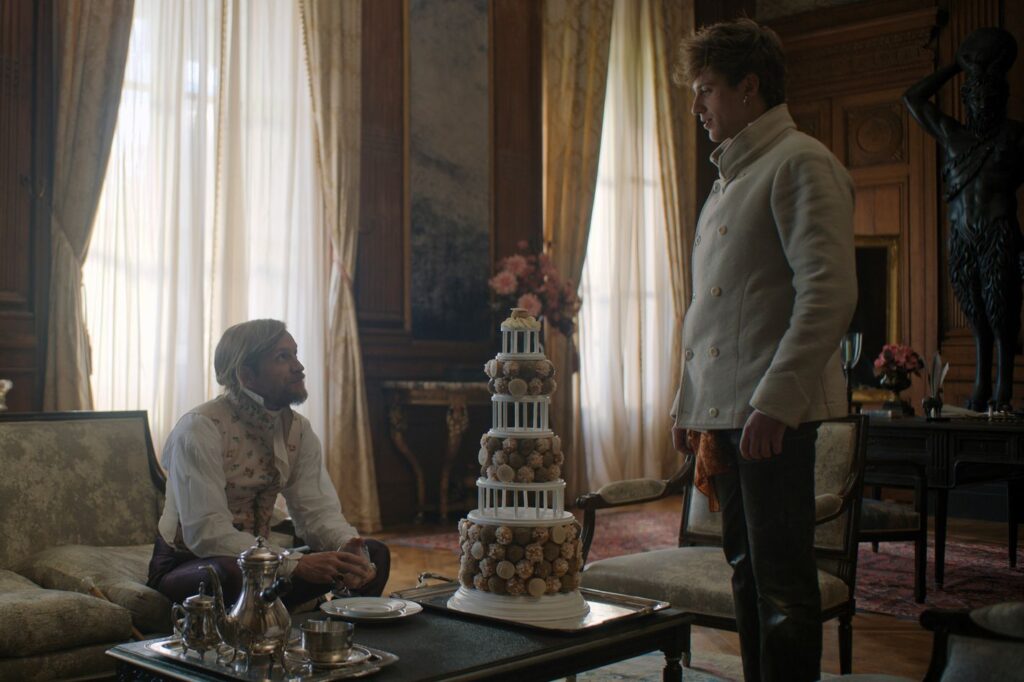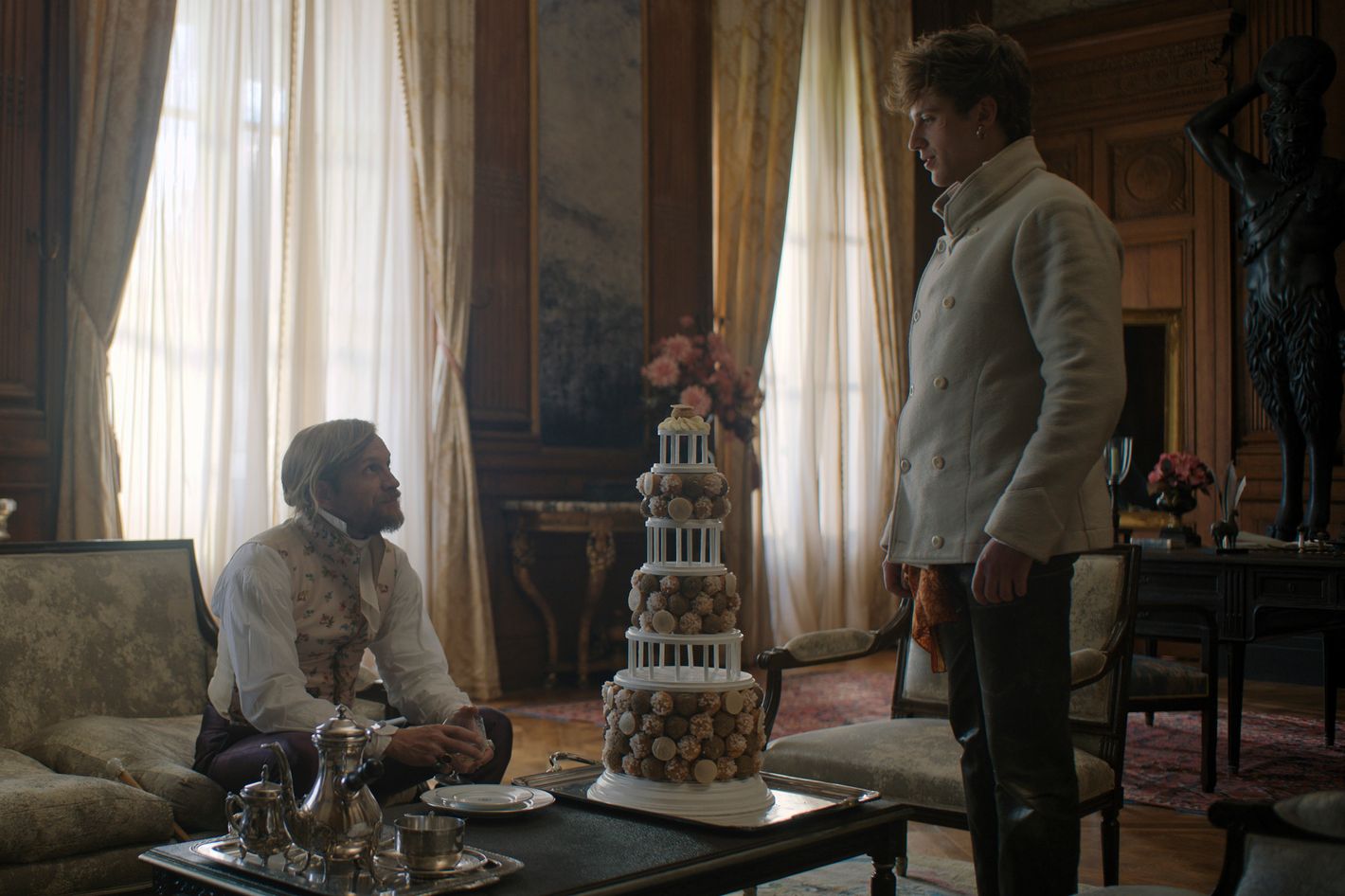
TV series in a language other than English can be an acquired taste for American viewers, but once in a while, a series breaks its niche containment to reach a wider audience: the political and home-life challenges of being Denmark’s first female prime minister in Borgen; the inexorable decline of Germany’s Weimar Republic in Babylon Berlin; the family saga set against the sweep of 20th-century Korean and Japanese history in Pachinko. The next series deserving of this sort of international buzziness is Carême, which introduces audiences to an extremely fictionalized version of Marie-Antoine Carême, a Napoleonic-era Paris chef who in real life codified many of the practices and dishes that leap to mind when we think of haute cuisine. Kitchen brigades, precise knifework, mise en place, the four mother sauces, even “Yes, chef!” — we have Carême to thank for jotting it all down.
The fictional Carême, played by Benjamin Voisin and his mop of precisely zhuzhed hair, is forever being dragged into a host of foreign and domestic intrigues and spy missions. Born to revolutionize cooking and to have sex with his beautiful girlfriend, yet forced to play a major role in international relations! It is very important to Carême that you know that its main character, more familiarly known as Antonin, is not a spy who cooks but a chef who makes the best out of finding himself plunked into political machinations. Carême also wants you to know that for all of the interpersonal and international high jinks its hero gets up to, he’s really one of the most normal foodies in France. The real freaks are the idle swells he encounters once he lands in the swanky home of aristocratic diplomat Talleyrand (Jérémie Renier). It all makes for a most lavish televisual repast that is frequently sumptuous, occasionally absurd, and always satisfying.
So, in celebration of the delicate balance of tonal flavors found within these eight zippily paced episodes, we’re recapping the most delicious moments from Carême’s first season, broken down into three categories: OUI, CHEF! Is reserved for the aspects of the show that go down smoothest, as things we expect to see in a prestige-y drama about cookery and espionage; FLAMBÉ-HEY-HEYYYY! denotes something just a bit absurd that nonetheless adds extra dimension and texture to the series’ whole deal; and SACRE BLEU! is for those elements that are strange enough to make you hit pause and pose the eternal rhetorical question: “Wait, what?!” So take your place á la table, arrange your serviette neatly in your lap, and bon appétit!
Spoilers follow for the entire first season of the Apple TV+ series Carême.
FLAMBÉ-HEY-HEYYYY! The opening credits: A great deal of Carême’s charm is that it knows exactly what it is and stands firmly in that knowledge. It is unsubtle and unserious about everything except cooking and baking. Early on, Antonin tells his lady love, Henriette (Lyna Khoudri), that he aspires “to make them come from my cooking,” and the credits reinforce his point, showing unseen but firm hands juicing ripe blood oranges and pomegranates. The entire sequence climaxes with the slow-motion explosion of a beautifully decorated multitiered cake shortly after Antonin places a little sprig of baby’s breath just so on the top layer. Your eyes do not deceive you; this credit sequence definitely asserts that food itself experiences sexual pleasure when prepared by Antonin Carême.
OUI, CHEF! Behold the power of food to shape world history: Antonin’s culinary ambition and fierce loyalty to his adoptive father, a fellow chef named Bailly, are equal drivers of the season’s plot. In the series premiere, Bailly is arrested out of the blue on no stated charges, and as the gendarmes are dragging him away, he tells Antonin to seek assistance from aristocrat/former bishop/diplomat Charles Talleyrand. Talleyrand immediately establishes a complex dynamic with Antonin, exploiting the young man’s eagerness to save his father for Talleyrand’s political advantage. He’s Antonin’s patron, father figure, handler, and nemesis all in one.

The first step along this messy road is maneuvering Antonin into accepting an invitation from Napoleon Bonaparte (Franck Molinaro) to prepare a high-stakes diplomatic luncheon. When Napoleon insists on Antonin serving a dessert in the form of a pyramid — a bald-faced invocation of the war between France and England, and a provocation to the English ambassador who is theoretically the guest of honor — Antonin duly wheels one into the dining room. As the ambassador gets very worked up and Napoleon silently smirks, Antonin sets the pyramid on fire. Once all of the hazelnut-nougat paper encasing his creation goes up in flames, what’s revealed is an array of beautiful petit-fours. The symbol of war is gone, and this brash young chef has saved the day with dessert!
SACRE BLEU! Sex in the walk-in as determinant of domestic policy: In order to convince Joséphine Bonaparte (Maud Wyler) to advocate with her husband for the protection of civil divorce, Talleyrand instructs Antonin to seduce her in the 19th-century equivalent of a walk-in refrigerator, and then marches Joséphine’s daughter and her husband, Louis (who happens to be Napoleon’s younger brother), blindfolded into that same walk-in, very nearly and purposefully catching them in flagrante. Joséphine assents to this bit of blackmail and then vows to Antonin that “I’ll have you eat your own cock!” Oh, also, that little assignation takes place during Talleyrand’s engagement party, which swiftly segues into a massive, pansexual orgy, as such events so often do!
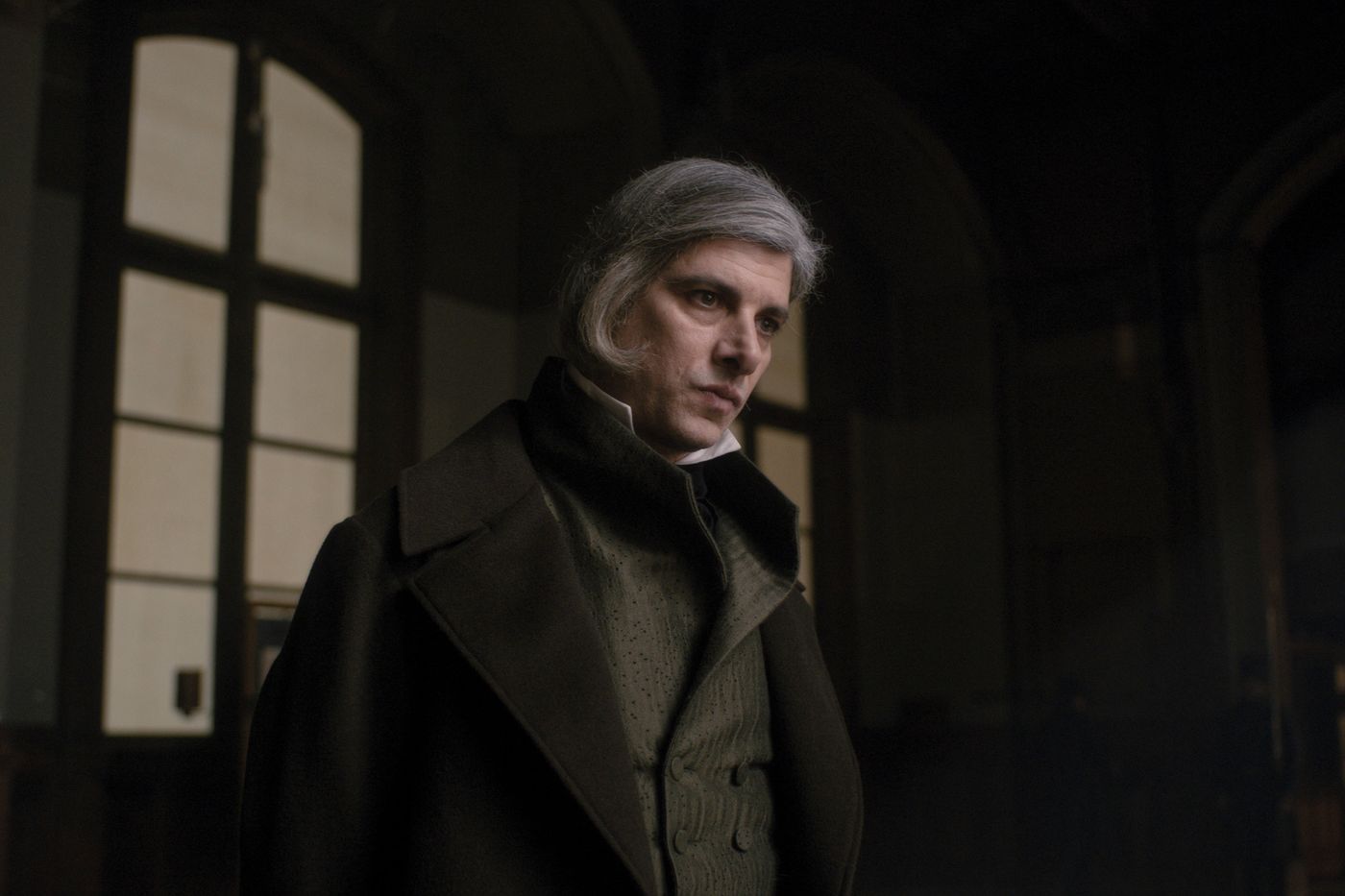
OUI, CHEF! A worthy adversary: Is minister of police Fouché kind of cartoonishly awful when he first appears in episode two, “Blackmail”? Considering his penchant for crushing suspects’ hands with a rifle butt and the pride he takes in having dispatched a large number of criminals using cannon fire, certainment! Mischa Lescot even occasionally bares his teeth at Antonin, in a display somewhere between intimidatingly vulpine and Fantastic Mr. Fox. Does Lescot’s performance also highlight Fouché’s investigative prowess? Again, very much yes! The minister of police has an incredible eye for and recall of details, such as the handwriting on a gossipy letter matching that found on a piece of evidence in the wreckage of a failed assassination attempt on Bonaparte. He’s also driven by pure loathing of the nobility, and is in a long-running rivalry with Talleyrand for influence in government. The opportunity to combine gatekeeping access to Bailly with his long-running desire to take down Talleyrand proves an irresistible combination of business and pleasure, and drives some of Carême’s best scenes.
SACRE BLEU! A note on Fouché’s hair: This is more confounding than shocking, but I genuinely am haunted by a minor detail of this formidable man’s coiffure: the wide, earlobe-length lock of hair that’s always hanging down the left side of his face. Every time Fouché is onscreen, I think, My guy, did you know that you can just tuck that behind your ear? You’ve done it on the right side of your head, why not the left, aussi, mon ami? A certain just-rolled-out-of-bed rumpledness is probably de rigueur for a man who gives the impression of working 24/7, but this is distracting!

FLAMBÉ-HEY-HEYYYY! Snoggin’ in the bathtub: This is odd, but it turns into a real Give the People What They Want moment. Catherine (Sigrid Bouaziz), Talleyrand’s mistress (and later, his wife), takes her luxurious baths in a massive black-marble circular tub installed in what looks like a mini-greenhouse built exclusively for fancy bathing. The steaming water is milky and strewn with rose petals, and Catherine wears a lightweight gown for the occasion. (Sure, why not?) She and Henriette — her lady’s maid as well as Antonin’s lover — sip Champagne and gossip until Talleyrand arrives to share the news of their latest political problème: In order to preserve civil divorce, one of the better changes wrought by the Revolution, they must cease living so scandalously and get married already. What these heroes do for la belle France! Talleyrand and Catherine celebrate their engagement in the time-honored manner of smooching in the tub, as their maids leave in well-practiced, discreet silence.
FLAMBÉ-HEY-HEYYYY! Unprecedented levels of multitasking: The very first scene of Carême shows us Antonin using two different types of whipped cream in his foreplay with Henriette, but that soon seems like so much child’s play. By the time episode three, “A Recipe for Disaster” rolls around, we see him inventing vol-au-vents at a party he caters, where he’s also tasked with creeping around Madame Germaine de Staël’s (Juliette Almanet) apartments for an incriminating political pamphlet and disposing of seditious evidence from her illicit printing press that’s hidden behind empty casks of wine. Now that’s what I call juggling other duties as assigned.

OUI, CHEF! Female characters who get to be interesting! In a show about a great man of olden times! What a concept: Antonin is surrounded by women who, variously, dote on, work alongside, mercilessly rib, and/or sleep with him. Henriette protects Antonin by being wily enough to successfully keep their relationship a secret from Fouché for a few episodes. Chef Agathe (Alice Da Luz) is talented, driven, and thorough, sometimes besting Antonin at his own culinary game, even as a slow-burn romance heats up between them. Kitchen veteran Liliane is often the tart-yet-affectionate voice of reason when Antonin gets a little too fanciful for his culinary britches. Talleyrand trusts his wife Catherine’s understanding of international relations so strongly that he deputizes her to attempt negotiations with Louis XVIII in exile! For good and ill, Joséphine Bonaparte wields tremendous influence over her husband! They’re all subject to the power and whims of the men around them, but they’re all finding ways to be the mistresses of their own fates, too.
SACRE BLEU! A monkey in the kitchen? And what’s up with that guy’s metal glove?? Work in the kitchens of Madame de Staël ceases abruptly when noted food critic and the founder of Almanach des Gourmands, Alexandre Grimod de la Reyniére, pops in uninvited, to help himself to samples of Carême’s in-progress dishes. The entitlement of a famous and powerful man is nothing new, but his monkey? Just jumping from station to station and stealing morsels of the food being prepared for human consumption? Ew! However, Grimod (Stéphane Varupenne) is one of those men to whom you simply can’t say no, and Antonin doesn’t even want to — it’s an honor to be paid a visit by the famed, influential eccentric known for his scathing opinions. The critic’s metal hand is a nod to the prosthetics Grimod wore throughout his life to conceal a genetic abnormality fusing his finger bones together, but that’s never explained, so viewers are left to imagine that he’s so fond of plucking tidbits out of simmering pans that he incorporates a bit of Knight of the Realm cosplay in his daily routine along with his New Romantics hairdo and eyeliner. RIP, Grimod de la Reyniére, you’d have loved the “Single Ladies” video.
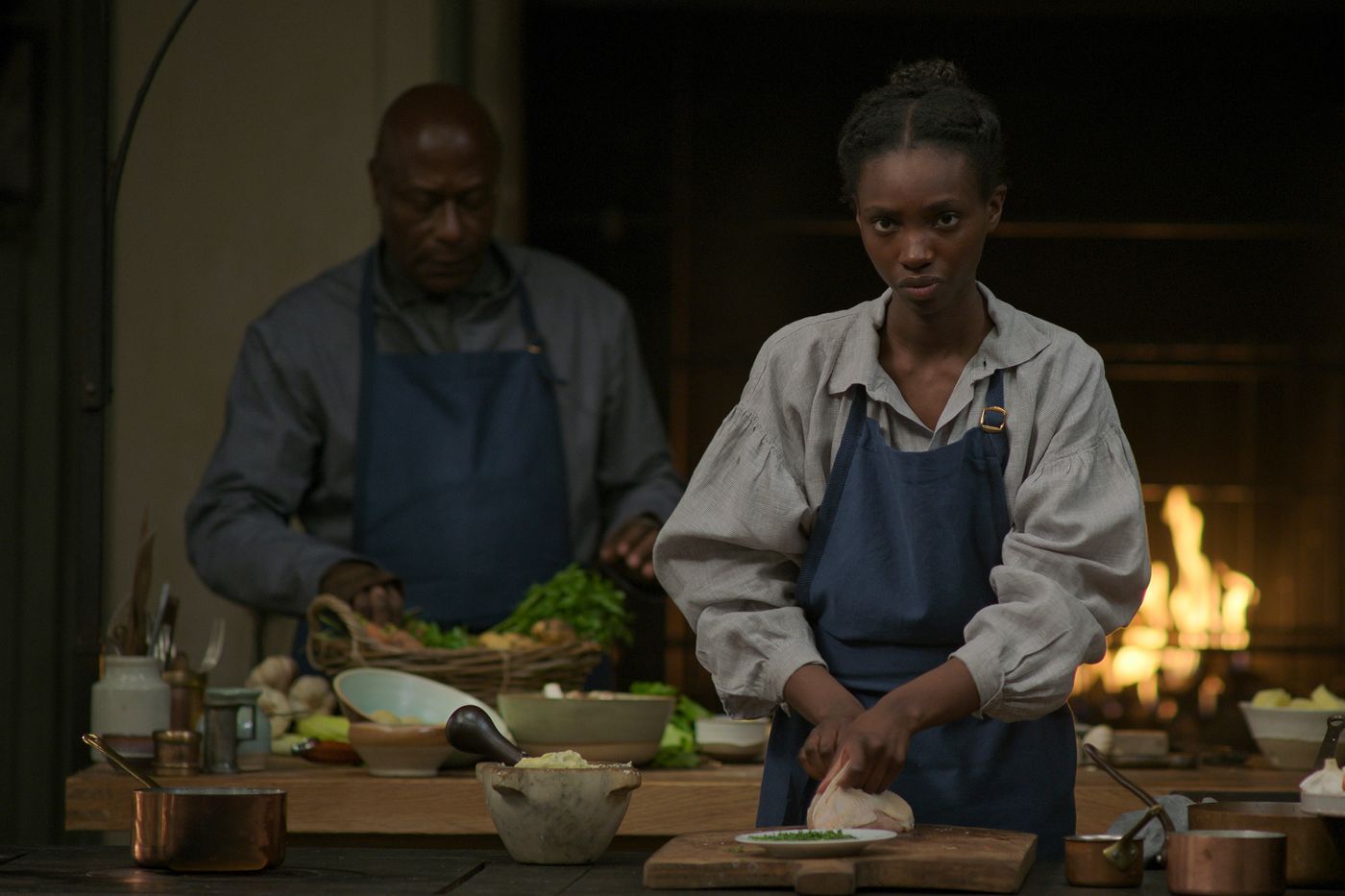
OUI, CHEF! Those gorgeous kitchen scenes! Whether Antonin is toiling away in his father’s restaurant or supervising the work of his brigades in Talleyrand’s kitchens, both the cooks and their dishes look great. The light thrown by candles and fires and bouncing off copper pots bathe the space in a cozy glow and lend fetching flushes to the cheek of every actor. Better still, the cooking scenes are luxuriously long, showing us technique and process, as well as the final plated dishes. The one exception is the dingy, sad kitchens at the Polish palace Antonin visits in episode four, “Buy the Crown!,” on a mission to convince Louis XVIII (Sharif Andoura), in exile since the Revolution, to renounce his claim to the French throne. The message is clear: Only French kitchens have the power to make everyone look superhot.
SACRE BLEU! What is going on with these costumes? I don’t require costume drama to hew precisely to made-up expectations of historical accuracy. Carefully judged, coherent anachronism can be a pleasure to watch, but I find myself being tested here. Antonin’s slutty little hoop earring? Gowns with flashy overlays that wouldn’t look out of place in Bridgerton? The shiny leather trench coat with such massive lapels that it could have been lifted from the set of Jackie Brown sported by Henriette when she flees Talleyrand’s estate in episode five, “The Contest”? Nearly ubiquitous popped collars and very visible topstitching on all of the outerwear we can see in detail? What is happening here? Does this show take place two centuries ago or nowish?
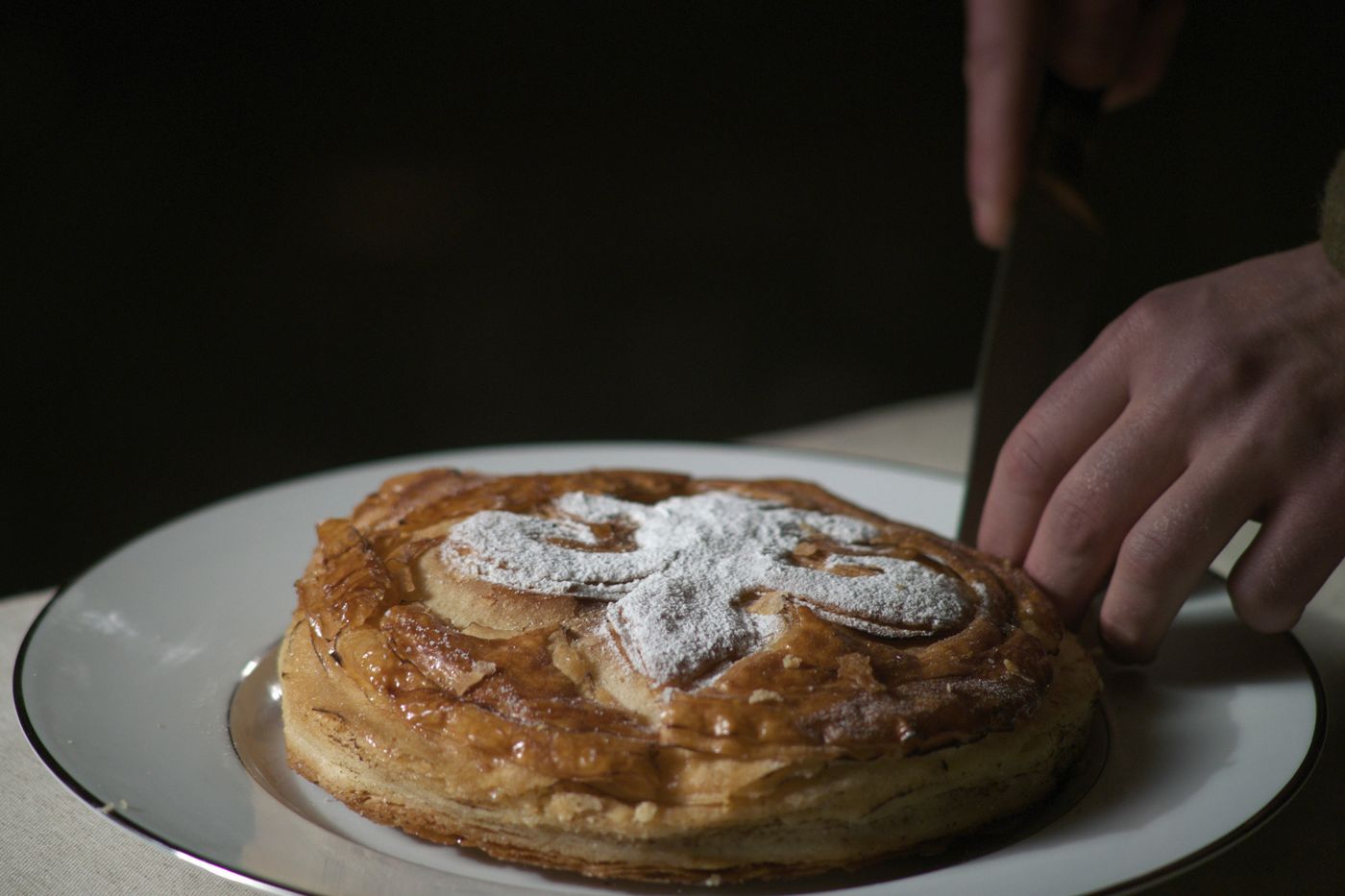
OUI, CHEF! A fancy lunch, encoded: In episode six, “Trompe l’oeil,” Fouché thinks he’s got Talleyrand and Antonin in his crosshairs after tracking down and arresting Cadoudale (Damien Escudier), a royalist involved in the attempt on Napoleon’s life in the series premiere. Suspicious and wily though he is, the minister of police’s powers of observation and deduction are no match for the messages encoded within Antonin and Agathe’s menu. Fouché knows that the braised lamb and galette des rois are hiding something, but he can’t suss out what. He misses entirely the third part of the instruction to Cadoudale to offer up a different conspirator’s name, hidden in a bit of sugar Antonin drops in the doomed man’s coffee while Fouché is occupied with the coin concealed in the galette. Relief, their long-simmering attraction, and their giddy pride in having invented espionage cookery lead Antonin and Agathe to bang in the carriage back home.
FLAMBÉ-HEY-HEYYYY! Literal meringue genius Antonin Carême. Remember when Antonin was forced to present a petit-four-filled pyramid at the state luncheon in the season premiere? He would have preferred to present a beautifully detailed ship made of meringue, but found his hand forced toward Egypt when Napoleon’s aide smashed the ship to smithereens with his sword. And they say, the French are subtle! Humph! This comes back around in episode seven with the arrival of Pope Pius VII at Hotel Galiffet. Carême, Agathe, and their crew have created a beautiful, meat-free Friday lunch, capped with an edible miniature re-creation of Michelangelo’s Pietà in exquisite alabaster meringue. His Holiness snippily refuses the meal in favor of an afternoon of prayer, so here’s hoping the kitchen staff enjoyed the leftovers.
OUI, CHEF!: Sisters are doin’ it [surviving birth in horrifyingly bleak circumstances] for themselves. When Joséphine Bonaparte’s daughter, Hortense, goes into early labor with her baby in breech, mother and daughter are forced into an impossible decision between Hortense’s life and her child’s. When all hope seems lost, Catherine’s trusted midwife convinces Agathe to use her tiny, dextrous hands to save the day, rotating the baby so Hortense can give birth without killing herself and the Bonaparte heir. These scenes, focused exclusively on six women of widely varying ages, races, and classes, caring for one of their own in such an elemental way, add some very welcome layers of depth and complexity to their characters, and to the relationship between Catherine and Joséphine. Can we request a season-two pivot to Appellez La Midwife: 19th Century Paris?

OUI, CHEF!: “Oui, Chef!” In the season finale, Napoleon’s coronation banquet suddenly balloons from an intimate gathering of 500 to a near free-for-all with 5,000 attendees, leading Antonin to call in every halfway decent cook in Paris. At the end of a battle-plan speech to his troops, including his insistence on everyone wearing chef’s whites and hats, he gets them all to respond, “Yes, Chef!” It’s not quite as satisfying as when Bob Odenkirk’s Mr. March returned to the bosom of his family in Concord, Massachusetts, and intoned “My little women”, but it’ll do.
FLAMBÉ-HEY-HEY!: More finale twists than a pretzel. “The Coronation” is packed with plot twists that set up major changes for a potential second season. By the end, Antonin has broken Henriette’s heart by deciding to stay with Agathe, who is pregnant. Henriette has returned from exile following Courtiade’s killing, and, furious, goes right back to work for Fouché. Several months later, on the day that Antonin and Agathe open Patisserie Carême, Antonin and Talleyrand learn that they’re both being packed off to the war together, where they’ll be tasked with feeding the army bigwigs and other duties (espionage, probably) as assigned. We go out with Antonin silently breaking the fourth wall, a winning smirk spreading across his face as he stares into the camera, clearly aware of just how ravenous he’s left us for season two.
Related
We can have a bonkers little show about food-as-sex-as-politics as a treat!

